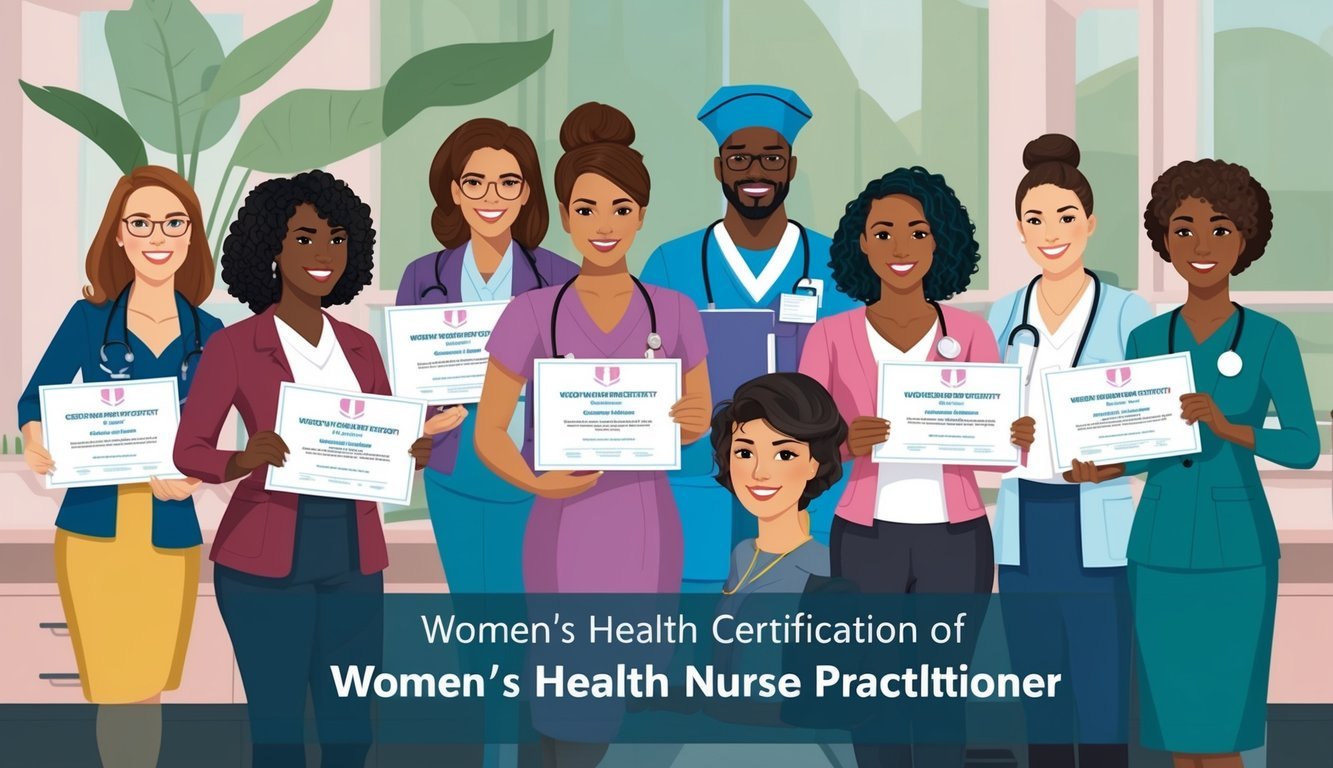When exploring the field of nursing, you may come across the term WHNP.
WHNP stands for Women’s Health Nurse Practitioner, an Advanced Practice Registered Nurse who specializes in providing comprehensive healthcare services to women across their lifespan.
These professionals play a crucial role in addressing the unique health needs of women, from reproductive health to primary care.
As a WHNP, you will engage in a variety of healthcare services, offering preventative care, education, and treatment for conditions specific to women’s health.
This specialization allows you to make a significant impact in the lives of your patients, ensuring they receive the individualized care they need.
The role combines clinical expertise with a commitment to improving health outcomes in the female population.
If you’re considering a career in this vital area of nursing, understanding what being a WHNP entails will help you prepare for the journey ahead.
By pursuing this path, you position yourself as a key advocate for women’s health, providing essential services that promote wellness and preventive care.
For more information on becoming a WHNP, you can explore resources from reputable organizations like the National Certification Corporation.
Understanding the Role of a WHNP
The role of a Women’s Health Nurse Practitioner (WHNP) encompasses a wide range of responsibilities centered on women’s health issues.
Through specialized training, WHNPs provide comprehensive healthcare services tailored to meet the unique needs of women.
Scope of Practice and Responsibilities
WHNPs focus on various aspects of women’s health, including primary care, reproductive health, and gynecological health.
Their responsibilities include:
- Performing physical exams and health assessments.
- Diagnosing and treating common illnesses, including infections and chronic conditions.
- Family planning, assisting women with contraception options and counseling.
- Providing preventive health screenings, such as breast and cervical cancer screenings.
They also manage menopause symptoms and provide education on health maintenance throughout different life stages, including pregnancy.
This unique skill set allows WHNPs to address health concerns from adolescence through menopause and beyond.
Work Environments: Hospitals to Clinics
WHNPs work in various settings, including:
| Work Environment | Description |
|---|---|
| Hospitals | WHNPs provide care in maternity wards and gynecological units, assisting with both inpatient and outpatient needs. |
| Women’s Health Clinics | These clinics offer specialized services like prenatal care and routine screenings tailored to women’s health. |
| Family Planning Clinics | Focus on reproductive health and contraceptive management, providing personalized care. |
| Community Health Centers | WHNPs deliver care to underserved populations, promoting access to health resources and education. |
Each environment allows you to address the diverse needs of women at various life stages.
Collaboration with Certified Nurse Midwives and Other Healthcare Professionals
Collaboration is vital in the role of a WHNP.
You often work alongside:
- Certified Nurse Midwives (CNMs): Together, you manage pregnancy and childbirth, ensuring comprehensive obstetric and gynecological care.
- Physicians: WHNPs often consult with doctors to coordinate care for complex cases, particularly in specialties like obstetrics and gynecology.
- Social workers and nutritionists: Collaborating with these professionals helps address broader health issues, ensuring a holistic approach to care.
This interdisciplinary teamwork improves patient outcomes by providing well-rounded and accessible healthcare services for women’s specific needs.
For further information, explore the resources available through National Association of Nurse Practitioners in Women’s Health.
Educational Pathways and Certification

To become a Women’s Health Nurse Practitioner (WHNP), you need to navigate specific educational pathways and certification processes.
Understanding the steps from initial nursing education to advanced practice certification is crucial for building a successful career.
From Bachelor’s to Master’s: BSN and MSN Programs
Your journey typically begins with obtaining a Bachelor of Science in Nursing (BSN).
A BSN provides a strong foundation in nursing principles and practices.
After completing your BSN, you can advance to a Master’s of Science in Nursing (MSN) program, focusing on women’s health.
In these programs, you will cover essential topics such as:
- Women’s health issues
- Advanced nursing practices
- Clinical decision-making
Ensure that the MSN program is accredited and offers specialized tracks for WHNPs.
Some institutions offer direct entry for RNs who hold a non-nursing bachelor’s degree, enhancing accessibility to advanced education.
This pathway ultimately prepares you for the critical roles you will undertake as a WHNP.
Doctor of Nursing Practice (DNP) Programs
Further advancing your education can involve enrolling in a Doctor of Nursing Practice (DNP) program.
DNP programs are designed for those seeking to elevate their clinical skills and leadership capabilities.
A DNP curriculum often includes:
- Evidence-based practice
- Healthcare policy
- Clinical leadership strategies
These programs typically require a master’s degree for admission and culminate in a practice-focused doctorate.
Graduating with a DNP can enhance your career opportunities and may provide an edge in competitive job markets.
Licensing and the Importance of the NCLEX-RN Exam
Before you can practice as a WHNP, you need to obtain your registered nurse (RN) license.
This involves passing the National Council Licensure Examination for Registered Nurses (NCLEX-RN).
The NCLEX-RN exam tests your knowledge and skills across various nursing competencies.
Successfully passing this exam is crucial for:
- Obtaining state licensure
- Enabling you to practice as an RN
Requirements for licensure vary by state, so it is important to review specific guidelines in your jurisdiction.
Once licensed, you may start pursuing advanced certifications and specializations in women’s health.
WHNP Certification Through the National Certification Corporation
To become a certified WHNP, you must pass an examination offered by the National Certification Corporation (NCC).
Eligibility generally requires a master’s degree in nursing with a focus on women’s health, alongside an active RN license.
The WHNP-BC certification demonstrates your expertise in women’s health, covering areas like:
- Reproductive health
- Maternity care
- Health maintenance
To maintain your certification, you need to complete continuing education requirements and renew your certification every three years.
This process ensures that you stay current with advances in women’s health care and nursing practices.
Career Advancement and Opportunities

In the field of women’s health, there are significant avenues for career advancement and various opportunities that can enhance your professional trajectory.
This includes favorable job outlooks, options for continuing education, and avenues for leadership and academic contributions.
Job Outlook and Employment Projections
The demand for Women’s Health Nurse Practitioners (WHNPs) is on the rise.
According to the Bureau of Labor Statistics, nurse practitioner roles, including WHNPs, are projected to grow by about 46% from 2020 to 2030.
This increase is fueled by factors such as an aging population, greater access to healthcare services, and a heightened focus on women’s health issues.
Average Salary: WHNPs enjoy competitive salaries.
The median annual salary for WHNPs is approximately $110,000.
In comparison, the general nurse practitioner salary typically hovers around $105,000.
With experience, you could command even higher wages depending on your location and specialization.
Role of Continuing Education and CEUs
Continuing education is essential for maintaining your certification and expanding your knowledge base.
You will often be required to complete a certain number of Continuing Education Units (CEUs) to maintain your WHNP status.
Institutions like Georgetown University offer advanced programs that equip you with the latest knowledge and skills pertinent to women’s health.
Engaging in ongoing professional development not only helps you stay current but also enhances your qualifications for leadership roles.
Additionally, specialized training can prepare you for emerging fields in women’s health, further boosting your career prospects.
Leadership and Academic Contributions
As a WHNP, you have the potential to take on leadership roles in various settings.
This can include management positions within healthcare facilities or administrative roles that focus on improving women’s health services.
You may also pursue academic contributions by teaching future nurse practitioners or conducting research that advances the field.
Opportunities to publish in nursing journals and present at conferences can enhance your professional reputation.
Engaging in leadership and academic involvement solidifies your commitment to the advancement of women’s health and allows you to influence the next generation of practitioners.
Clinical Skills and Patient Care
As a Women’s Health Nurse Practitioner (WHNP), you engage in diverse clinical skills essential for quality patient care.
These skills encompass comprehensive health assessments and specialized procedures tailored for women’s unique health needs.
They ensure effective management throughout various stages of a woman’s life.
Comprehensive Health Assessments and Diagnostic Tests
You perform thorough health assessments that include obtaining detailed patient histories and conducting physical examinations.
These assessments help in identifying potential health issues, guiding necessary diagnostic tests, such as Pap smears and endometrial biopsies.
Utilizing laboratory tests effectively aids in diagnosing sexually transmitted infections and chronic health issues.
You stay vigilant in monitoring conditions like ovarian cancer and provide targeted preventative care.
Routine screenings and diagnostic evaluations are vital.
They not only facilitate early detection but can significantly enhance health outcomes for your patients.
Women’s Health Across the Life Span
Your role involves supporting women through various life stages, from adolescence to menopause.
You provide health promotion and education tailored to each stage.
In prenatal care, you guide expectant mothers through pregnancy, offering valuable resources on nutrition, exercise, and emotional well-being.
During the perinatal period, your care extends to postpartum evaluations, addressing issues such as postpartum depression and breastfeeding support.
You also focus on family planning and contraception counseling, helping patients make informed decisions about their reproductive health.
Understanding the unique needs of women at different life stages is crucial for effective care.
Developing Effective Treatment Plans
Creating personalized treatment plans is pivotal in your practice.
These plans are often based on a patient’s specific health concerns, such as infertility or chronic conditions like diabetes.
You incorporate a holistic approach, pairing medical interventions with lifestyle recommendations that promote overall well-being.
In addition, your expertise in contraceptive counseling allows you to discuss various options, including long-acting reversible contraception.
Each plan is tailored to ensure that pharmacological and non-pharmacological interventions work in harmony to enhance the patient’s quality of life.
Specialized Skills in Obstetrics and Gynecological Procedures
Your training enables you to handle various obstetric and gynecological procedures.
Skills in performing gynecological exams and managing the complications of pregnancy are critical components of your role.
In addition to routine examinations, you provide specialized care during high-risk pregnancies.
Your ability to collaborate with other healthcare professionals ensures comprehensive care.
You may also be involved in teaching patients about sexual health and wellness, making you a vital resource in their healthcare journey.
By mastering these specialized skills, you contribute greatly to the continuum of care that defines women’s health.
Professional Organizations and Resources

Professional organizations and resources play a crucial role for Women’s Health Nurse Practitioners (WHNPs).
They offer a platform for continuing education, networking, advocacy, and policy contributions that are essential for your professional development.
American Association of Nurse Practitioners and Other Associations
The American Association of Nurse Practitioners (AANP) is a key organization for you as an APRN.
It provides extensive resources.
These include clinical guidelines, networking opportunities, and continuing education programs.
Moreover, associations like the National Association of Nurse Practitioners in Women’s Health (NPWH) offer specialized support for WHNPs.
These organizations help you stay updated on best practices in areas like Advanced Health Assessment and Postnatal Care.
Membership grants access to publications, conferences, and webinars that address women’s health issues, ensuring that you have the latest information at your fingertips.
Advocacy and Policy Contributions
Advocacy is a vital element of professional organizations.
They work to influence health policies that affect women’s health care on both state and national levels.
For instance, the NPWH actively participates in legislative initiatives that promote the role of nurse practitioners.
By engaging in these advocacy efforts, you can help shape policies related to holistic care and the broader scope of practice for Certified Nurse Midwives and WHNPs.
Through your involvement, you can ensure that the needs of your patients are represented in healthcare decision-making processes.
Networking and Professional Growth
Professional organizations also offer critical networking benefits.
When you attend conferences, workshops, and local chapter meetings, you can connect with peers and mentors.
You can exchange ideas, share experiences, and find potential job opportunities.
These organizations also provide resources for professional growth.
For example, they offer scholarships or mentorship programs specific to WHNPs.
Engaging with your peer community can enhance your skills in women’s health, keeping you informed and supported in your career.

